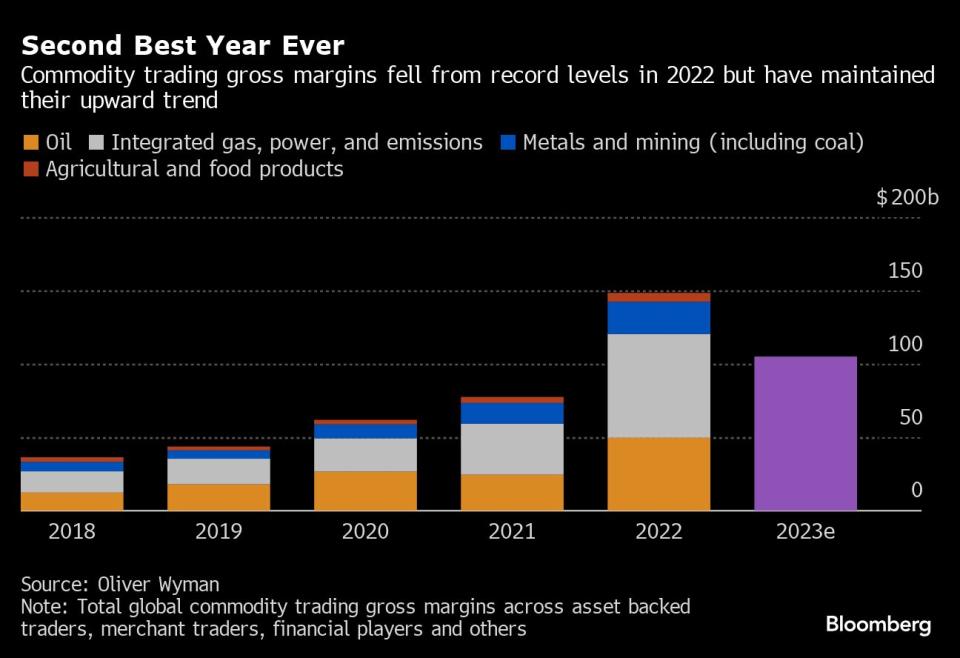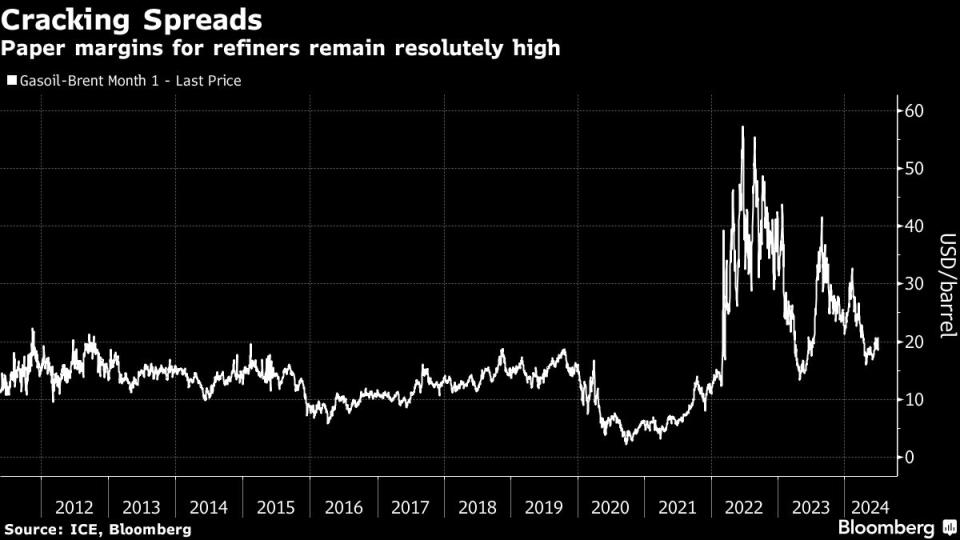Cash-Rich Energy Traders Are Snapping Up Refineries From Big Oil
(Bloomberg) -- Commodities traders flush with cash are buying oil refineries that energy majors are increasingly turning their back on.
Most Read from Bloomberg
Biden’s Fourth of July Shrouded by Pressure to Drop 2024 Bid
Kamala Harris Is Having a Surprise Resurgence as Biden’s Campaign Unravels
Newsom Shocks California Politics by Scrapping Crime Measure
China Can End Russia’s War in Ukraine With One Phone Call, Finland Says
It’s one of the areas where trading houses — who have long coveted the refining and distribution assets that help drive oil majors’ mega trading earnings — are investing huge returns from the most profitable period in their histories.
Owning those assets offers a chance to have more options when making trades, greater exposure to physical and paper markets and better insight into fuel supplies. The sites are coming up for sale as Big Oil faces shareholder pressure to trim portfolios to focus on assets with the best returns, while also offloading or cleaning up major polluting businesses like refineries.
There are numerous examples of late. Bloomberg last month reported that trading giant Vitol Group bid for assets of US refiner Citgo Petroleum Corp., following a two-year deal spree in which it invested in Italian refiner Saras SpA and fuel stations in Turkey and South Africa.
At the same time, Glencore Plc is part of a venture that agreed to buy Shell Plc’s Bukom refinery in Singapore, while a consortium including Trafigura Group is in exclusive talks to buy France’s Fos-sur-Mer refinery.
“Recent sales have largely gone to private equity, but increasingly traders are coming in” to investment in refineries, said Liz Martin, an adviser at Energex Partners and a former BP Plc trader.
Gaining a foothold in the refining industry gives traders more options when deciding whether to send certain oil grades to their own refinery or elsewhere, such as in the open market — depending on what makes more money.
“The traders see an opportunity to end up with a plant that can run a slew of different crude oils,” said Kurt Chapman, a board member of trader Levmet and former head of crude at Mercuria Energy Group Ltd.
Another benefit of having a backstop for cargoes is that it lets traders be bolder in physical windows that ultimately set regional benchmark prices. Plus, it gives them more reason to take paper positions to hedge their physical exposure, allowing them to be bigger players in swaps and futures markets.
“If you have an outlet for Midland WTI in Europe because you’ve taken on a refining asset, then you have direct physical influence on the pricing mechanism,” Chapman said. Refineries “give you insights into what the underlying is doing and allows you to potentially leverage that in the paper markets to enhance your trading.”
Some upstream producers have traditionally been reluctant to deal with merchants selling on their cargoes at a profit, so owning a refinery puts traders in a better position to strike supply deals because plants are an important buyer of crude barrels. Securing those supplies can provide more of an idea on volumes and timing of competitors’ cargoes as well, aiding trading decisions.
The refineries traders have recently bought into are typically located in major trading hubs like the Mediterranean Sea and Singapore Strait, which makes them accessible for delivering a wide range of crude types. The deals have generally been for stakes or as part of consortiums, rather than outright acquisitions on their own, as traders tend to be most interested in obtaining crude procurement rights for these plants.
Why Now?
Blockbuster profits have given commodity traders the cash to invest in assets like refineries, as well as build out metals and agriculture teams. But another key aspect of the refinery push is simply availability.
Plants around the world are coming up for sale — and at knockdown prices. Despite good margins, companies like BP, TotalEnergies SE, Shell and Exxon Mobil Corp. have been letting go of assets that they no longer consider a core part of their business.
Oil majors are also under pressure from institutional investors to cut emissions. One option is to spend money upgrading refineries to become more efficient or make greener fuels. Another is to just offload them altogether.
“Shareholders want companies to reduce greenhouse gas emissions, and one way of doing that is to sell refineries,” said Steve Sawyer, a consultant at Facts Global Energy. “It doesn’t do much for the planet because buyers are going to run it in a similar way, but that’s a major reason why refinery owners are selling.”
Refining margins have historically been very cyclical, and big fixed assets with volatile margins could potentially pose a risk for traders that are highly leveraged. Vitol’s profits at one point sunk to near zero as it struggled with the costs of upgrading Canada’s Come by Chance plant in the 1990s. And in 2020, tough trading conditions forced Gunvor Group Ltd. close its loss-making oil refinery in Antwerp, Belgium, an asset it has since sold off.
Still, margins could become steadier as the industry slows investment in new refineries in anticipation of peak oil demand, even as fuel consumption across the developing world continues to grow rapidly.
“Something we’ve been saying for some time was that whilst there was a surge in refining capacity between about 2019 and 2025, there was very little planned for post-2025,” said Sawyer, who previously managed refining operations for BP. “That is still the case.”
--With assistance from Alex Longley and Rachel Graham.
Most Read from Bloomberg Businessweek
Dragons and Sex Are Now a $610 Million Business Sweeping Publishing
The Fried Chicken Sandwich Wars Are More Cutthroat Than Ever Before
For Tesla, a Smaller Drop in Sales Is Something to Celebrate
©2024 Bloomberg L.P.

 Yahoo Finance
Yahoo Finance 


